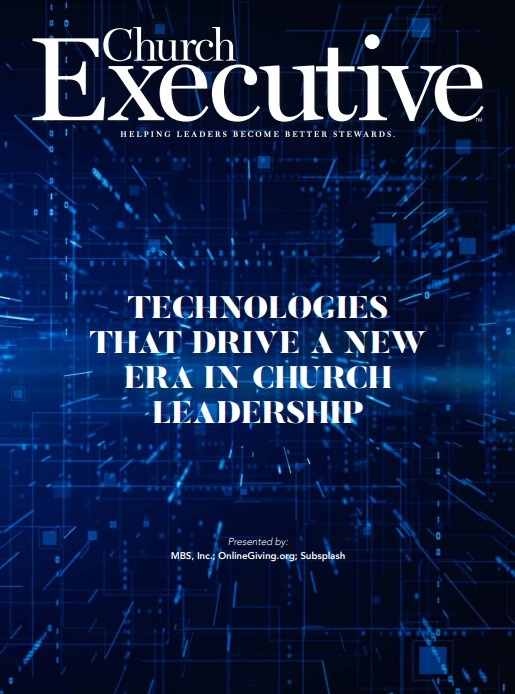
 AI is a tool that, if used properly, can advance ministry
AI is a tool that, if used properly, can advance ministry
By Jonathan Smith

President
MBS, Inc.
Artificial intelligence (AI) has been a significant technological advancement and will continue to revolutionize our lives, with some suggesting AI is to this generation what dial-up internet was to the prior generation.
But with artificial intelligence comes many questions.
• Is it safe?
• Can it be trusted?
•Will AI lead to the destruction of life on our planet?
In many ways, our sci-fi imaginations get the better of us: Is AI the Terminator come to life? Have we finally built Mr. Data from Star Trek: The Next Generation? When can I order my first C-3PO droid from Amazon?
The more constructive question for church leaders is: How will AI affect churches and ministries?
One thing to remember…
AI has been around for a while in the form of algorithms used to process data and determine outcomes. Algorithms determine our social media feeds, protect our bank accounts and personal information, and even help with traffic management.

As the algorithms get “smarter,” the appearance of intelligence emerges.
Add to that the ability to tackle more complex, subjective questions — such as “Which national park is the best?” — and the algorithms behind AI begin to give it the appearance of discernment.
But AI can’t discern. Remember, the data from which it draws its conclusions was provided by humans that might not always agree and are often filled with biases. So, while artificial intelligence does its best with what it has, we’ve found it to be extremely flawed.
It harkens to the early days of the internet when we emphasized that not everything you read online is true.
Now, the emphasis is on reminding people that, not only is the internet not the ultimate source of truth, but neither is social media — and neither is AI.
Embrace AI, do not fear it
How does all this affect ministries?
#1: There’s no need to be scared. Artificial intelligence is not life — only God can create life. AI can only mimic the creative process.
#2: You can’t always trust it. Phishing scams and get-rich-quick schemes flourish because we believe what we see online. You don’t know if there’s another human trying to scam you or another human using AI to make the scam more complex, but you can’t naively trust AI.
#3: Ministries should embrace AI. (Yes, you read that correctly.) Churches and ministries shouldn’t run and hide just because AI poses risks. Instead, they should use AI for ministry effectiveness.
Convene conversations around AI
Use AI for discipleship. Sure, your theology will come into play when evaluating artificial intelligence, but is your church teaching about it with any theological depth?
Have you considered community events to teach the good and the bad? What about teaching basic online safety, including code words to avoid child voice scamming, or that using AI to cheat on one’s homework is a sin? I assure you: I typed what you are reading here. But how do you know? How would a school know? Even AI tools used to detect AI-created content had to be shut down because the tools failed more than 60 percent of the time.
AI’s undeniable power
Meanwhile, the power of AI is undeniable and creates questions and concerns.
Its ability to generate lifelike videos is amazing. The benefits to church production include not having to record your pastor literally saying every word, but rather, setting up an AI version, improving efficiency.
The sin-cursed side of this is, what happens when the pastor leaves and the church holds on to the likeness and makes it say things the pastor would never say?
The world is constantly changing. We need to teach that the Bible is forever, providing a strong theological foundation so that, whatever comes next, our people are ready to handle it in a Godly manner. None of these technological developments surprised God, but do we really believe and teach that? The Bible teaches the need to discern right from wrong, and we must teach that same discernment online.
Using AI to strengthen ministry
Data is great, but it’s what you do with the data that really matters. For example, AI can be an ally by going through data and providing useful information to help close the proverbial “ministry back door” — where people stop attending before leaders realize it. AI can help us better evaluate attendance patterns and changes in involvement, even comparing attendance with giving trends. This information might help us understand who is at risk of leaving the church or struggling in a manner that a call or visit might prove fruitful. What used to be complex and take hours can now be simplified and assessed in real time.
Copyright, defamation concerns
AI has quickly outdated copyright laws. Personal privacy and intellectual property lawsuits are just starting to head to court. Defamation cases are being filed. But in these cases, who’s to blame? The AI? Or those who programmed the AI? The decisions to come will reshape how we know and understand the use of this technology, even in church contexts.
Stewarding AI for good
I’m excited about AI’s potential for affecting the Kingdom. But all new technology requires responsible use.
Jonathan Smith is Director of Technology at Faith Ministries in Lafayette, Ind., and president of MBS, Inc. [ www.mbsinc.com ] He is an author and frequent conference speaker.


